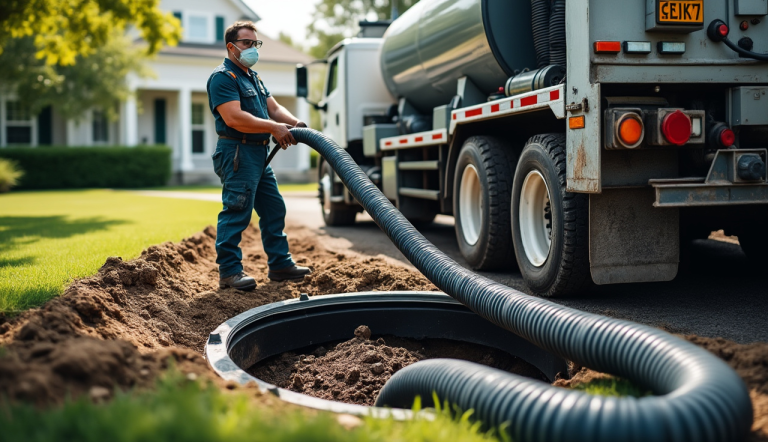How to Recognize Signs of Septic System Failure: 5 Warning Signs You Can’t Ignore
Septic systems are important for homes not connected to city sewer lines. Knowing the signs of a failing septic system can save you money and hassle. This article will help you spot problems early on.
Key Takeaways
- Slow drains could mean a blockage.
- Gurgling sounds in pipes may signal trouble.
- Bad odors near drains indicate leaks.
- Standing water or lush grass near the drain field can show a problem.
- Regular maintenance is key to a healthy septic system.
For those living in rural areas, understanding septic systems is crucial for household management. You can learn more about reliable septic system inspections to ensure everything is functioning properly.
What is a septic system?
A septic system is a way to treat wastewater from your home. It is made up of a tank and a drain field. The tank holds waste and helps break it down. The drain field lets the treated water soak into the ground. This system usually works well for many years when cared for properly.
Why do septic systems fail?
Septic systems can fail for several reasons. Overloading the system, poor maintenance, or damage can cause problems. Middletown has many homes with septic systems. This makes knowing how to spot issues even more important.
Common reasons for failure
- Overloading: Too much water can fill the tank too quickly. This can happen if many people are using water at once or if there are leaks.
- Poor maintenance: If you don’t pump your tank regularly, solids can build up and block the system.
- Soil issues: If the soil is too dense, it might not let water drain away properly. This can cause backups.
- Tree roots: Roots from nearby trees can invade pipes. This leads to blockages and damage.
Signs your septic system is in trouble
Recognizing the signs of a failing septic system is key. Here are some common warning signs to watch for.
1. Water or sewage is backing up inside your home
If you notice water backing up in your sinks or toilets, this could be a serious sign. It means your septic system may not be draining well. You should call for help right away.
2. Slow drains
Do your sinks take longer to drain than before? This could mean there is a blockage somewhere in the system. Slow drains can be a sign that your septic tank is full or the pipes are clogged.
3. Gurgling sounds
If you hear gurgling sounds in your pipes, it may mean air is trapped. This could be a sign of a blockage. The air should flow smoothly through the pipes. Gurgling is a red flag.
4. Pooling water or dampness near the drainfield
If you see water pooling in your yard, your drain field may be in trouble. This can happen if the system is overloaded or malfunctioning. Look for wet spots or patches of grass that are greener than others.
5. Bad odors
Unpleasant smells near your septic system or in your yard can indicate a problem. If you smell sewage, this could mean a leak. This is a serious issue and should be addressed quickly.
6. Bright green grass above the drainfield
Strange growth can indicate a problem. If the grass is greener and taller above the drain field, it may be a sign that untreated sewage is leaking. This extra moisture can cause unusually lush patches.
7. Algae blooms in nearby water
If you notice algae growing in nearby ponds or streams, it could be a sign of septic system failure. Sewage can contaminate local water sources. This is harmful to wildlife and may even affect your drinking water.
8. High levels of coliform in your water well
Coliform bacteria can enter your water supply if your septic system fails. This can cause serious health risks. Regular testing of your well water will help you keep track of any issues.
Additional Signs to Watch
- Frequent backups: If backups are happening often, it’s a sign of trouble.
- Flushing issues: If multiple toilets are struggling to flush, investigate further.
- Unusual noises: Listen for unusual sounds when using water fixtures.
How to prevent septic system failure
Preventing issues is easier than fixing them later. Here are some tips to keep your septic system healthy:
1. Schedule regular pumping
You should pump your septic tank every 3 to 5 years. This depends on the size of your tank and how many people are using it. Regular pumping helps prevent buildup of solids.
2. Limit water usage
Try to spread out your water use throughout the day. For example, avoid running multiple loads of laundry at once. This can overload your septic system.
3. Be careful with what you flush
Only flush toilet paper and human waste. Items like wipes, paper towels, and certain foods can clog the system. Follow local guidelines for what to put down the drain.
4. Keep roots away
Plant trees and shrubs far from your septic system. Roots can invade pipes and cause blockages. It’s best to keep the area clear.
5. Monitor your drain field
Keep an eye on your drain field for any changes. Look for wet spots or unusual grass growth. Early detection can help prevent bigger issues.
Preventive Maintenance Table
| Maintenance Task | Frequency | Purpose |
|---|---|---|
| Septic Tank Pumping | Every 3-5 years | Prevents buildup of solids |
| Drain Field Inspection | Annually | Identifies issues like pooling or odors |
| Soil Test | Every 3 years | Ensures soil is suitable for drainage |
| Pipe Inspection | As needed | Detects root intrusion or blockages |
What to do if your septic system fails
If you suspect your septic system has failed, take action quickly. Here are some steps to follow:
1. Stop using water
Reduce water use immediately. This helps minimize the problem until a professional can examine the system.
2. Call a professional
It’s best to contact a septic service right away. They can diagnose the issue and suggest repairs. In Middletown, companies like United Sewer & Septic can help with emergency services.
3. Follow their advice
After a professional inspection, follow their recommendations. This may include repairs or maintenance tasks. Act quickly to prevent further damage.
You might also find expert services for jet septic systems that can help in resolving recurring issues.
The importance of regular maintenance
Regular maintenance is key to a healthy septic system. It helps avoid costly repairs and keeps everything running smoothly.
1. Protect your investment
Regularly caring for your septic system protects your home and wallet. Repairs can be expensive, and a failing system can harm your property’s value.
2. Keep the environment safe
A well-maintained system keeps wastewater from contaminating local water supplies. This protects wildlife and ensures clean drinking water.
3. Peace of mind
Knowing your septic system is in good shape gives you peace of mind. You’ll be less likely to face unexpected issues.
Maintenance Benefits Table
| Benefit | Description |
|---|---|
| Cost Savings | Prevents expensive repairs by early detection |
| Environmental Protection | Reduces risk of contamination |
| Health Safety | Prevents exposure to harmful bacteria |
Conclusion
Spotting signs of septic system failure can save you money and hassle. Look for slow drains, gurgling sounds, and bad odors. Watch for standing water or overly green grass. If you notice any of these signs, act fast. Call a professional to help diagnose and fix the problem. Regular maintenance can prevent many issues and keep your septic system running well for years.
Final thoughts
In Middletown, many homes rely on septic systems. By understanding how to recognize signs of problems, you can keep your home safe and your system working well. Regular checks and maintenance will help you avoid costly repairs and ensure your home runs smoothly.
Enjoy your home without the worry of septic issues. With proper care and attention, your septic system can serve you well for many years.


